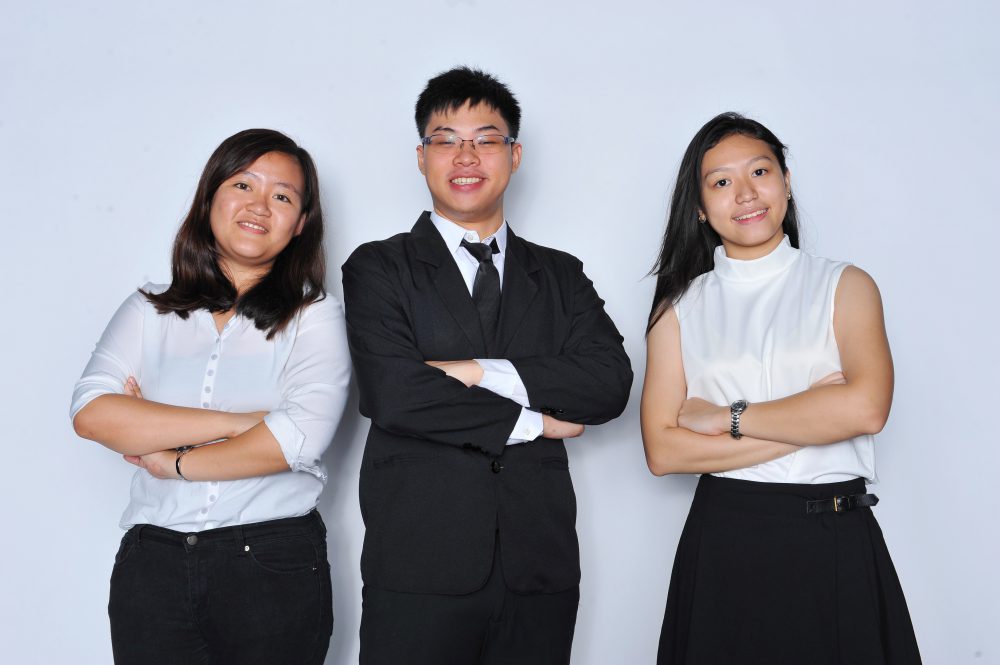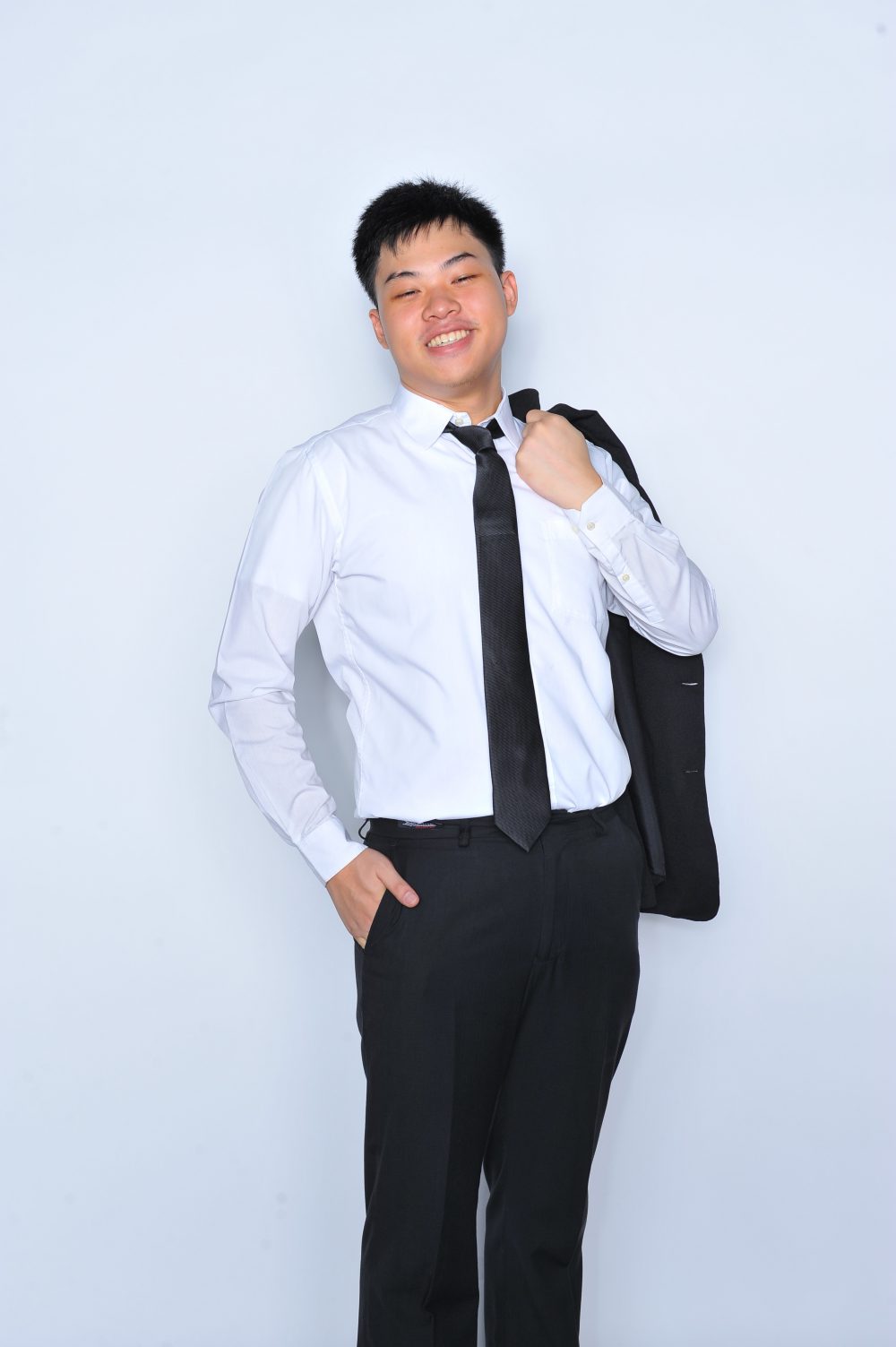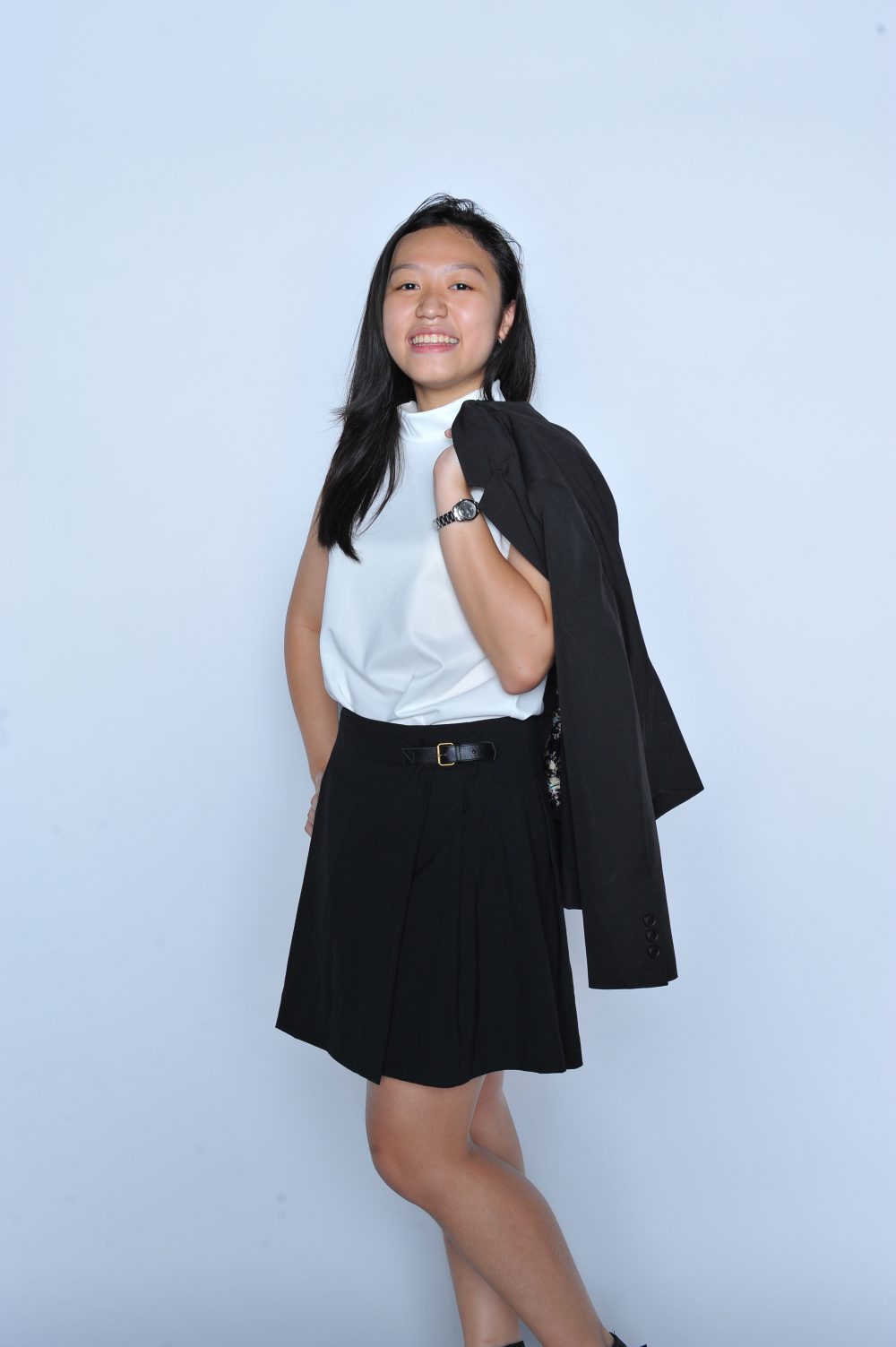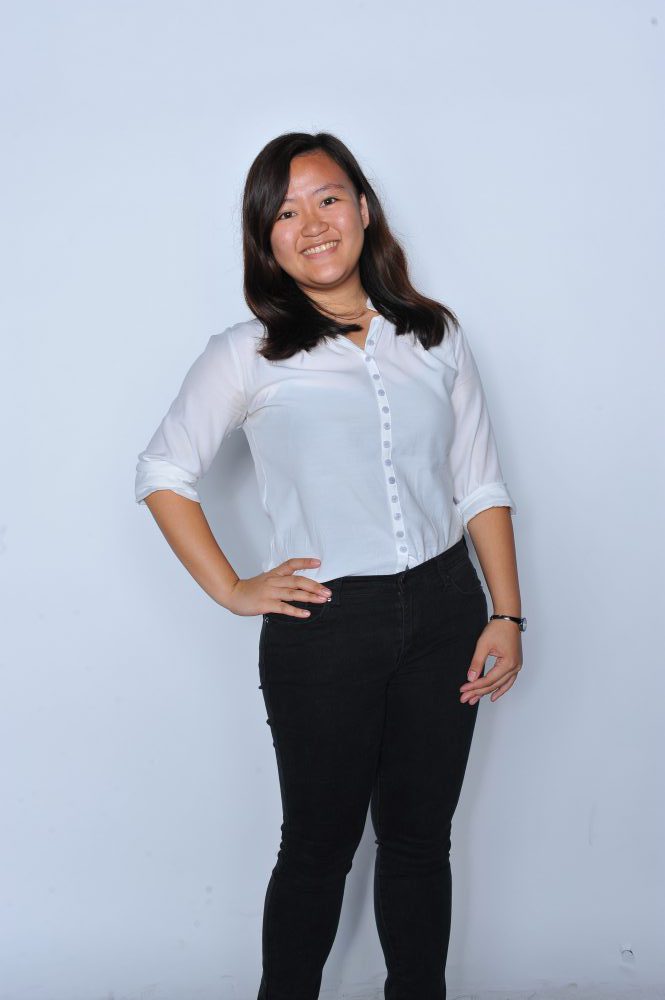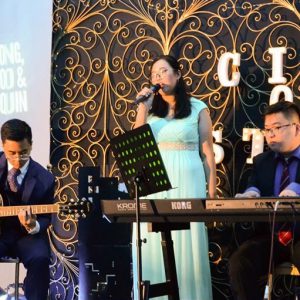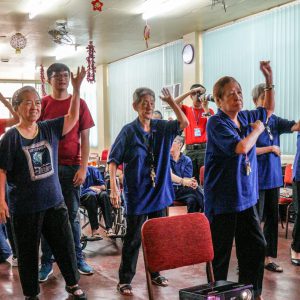The Corporate Relations (CORREL) Department is in charge of acting as liaisons to corporate partners. The department spearheads the marketing efforts of the organization and the marketing seminars and workshops to develop the talents of interested members. With the leadership of these student leaders, Alex (VP for Corporate Relations), Selena (AVP for Corporate Systems), and Clarissa (AVP for Corporate Training), quite literally, have Celadon’s back, bridging the gaps between the organization and its corporate partners.
Alexander Españo
Patricia Jose (PJ): How different was your high school from AdMU?
Alex Españo (AE): My high school is non-sectarian, so we didn’t have any classes on religion. When I came into Ateneo, there were theology courses, masses, praying during classes; something I didn’t experience in high school. Since I came from a Chinese school, the students were predominantly Chinese. We all understood each other, usually sharing the same traditions. In here, people suddenly became diverse. I think there’s a certain level of culture shock I experienced, and it was hard coming out of a Chinese-school bubble. That was the most striking difference for me.
PJ: How did you adjust to life in Ateneo?
AE: In terms of culture shock, I found a home inside Ateneo, which was Celadon. Somehow, that was my buffer in adjusting because having friends who I could relate with on some hardships beside me helped. Having someone who understood what you were going through and being by your side was a good support system for me.
PJ: What was Celadon like when you first joined?
AE: I remember visiting the org room almost every day. I’d see people playing mahjong and hanging out. That was my hands-on experience of Celadon, as a freshman and a sophomore. I didn’t join much core teams, but I would participate in the training programs like Junior Manager Program (JuMP), Leadership Development Program (LDP) and the [marketing] seminars.
PJ: What got you to join Celadon?
AE: I had high school friends who graduated ahead of me who were a part of Celadon. I heard stories about a Chinese org in Ateneo since high school. It gave me an idea that there’s a place for Chinese students to get together and join events, so even before I went to college I knew that Celadon was where I wanted to head [into].
PJ: How has Celadon changed you since you’ve joined it?
AE: Coming from high school, I was a very introverted person. Talking to strangers and acquaintances was a struggle because I was a very shy and quiet person back then. In joining the org, I found myself involved with projects where my communication and interpersonal skills were really tested.
In CORREL, I need to talk to sponsors, negotiate terms and conditions, and maintain good relations. That involves talking to a lot of strangers, with you being able to say the right words. For me, those brought the greatest change I found in myself that right now, I’m almost comfortable talking to an audience, almost comfortable saying “hi” to strangers.
Of course I haven’t fully mastered it yet. Until now I am continuously growing and developing myself through my work in Celadon.
PJ: What compelled you to join CORREL?
AE: My first two choices were either Financial Affairs or Corporate Relations. Finance, because in handling budgets of a project, I don’t think you have to talk much. With CORREL, I saw it as an eventual career path I would see myself in. I remember questioning if it was the right department for me, but I decided to take it as a challenge, to see how far I could go.
True enough, I attended the marketing seminars back in my freshman year, and met a lot of people who supported my journey in CORREL. Through their support and mentorship, I found that CORREL was for me, even though I don’t have all the qualities that a stereotypical CORREL person might have. I saw that I could develop these along the way. It’s really not a requirement at the beginning. As long as you have the support systems, the drive to learn these things on your own, and the help of others. I learned my shortcomings or introverted-ness weren’t barriers to entry.
PJ: What made you decide to be an EB for CORREL?
AE: “A leap of faith.” During my second year, I became an AVP. Before that I never held a manager position in CORREL or any other department inside Celadon. I think what pushed me that time was the encouragement of my eventual mentor who was Jesse Lui, the VP for CORREL then. His words of encouragement and guidance inspired me to push forward in braving the struggles that needed to be overcome for me to develop myself in a department like CORREL. Eventually, after I became an EB, everything else followed. I can say that going through those obstacles made me realize that Celadon was an org that I want to see improve and be the best that it could be, and that through my work, I can contribute towards that goal.
PJ: How would you describe your leadership style?
AE: My leadership style starts small and it grows outward. I always start small, then I work my way towards a bigger audience. I prefer having ICs (individual consultations) to get a feel of the person.
It stems from my introverted past, which is why I choose to conduct small but focused efforts.
PJ: What are your takeaways on being the VP for CORREL?
AE: A major learning: always put the people first. Put yourself in their shoes, imagine how they are doing under your current leadership, because however good your systems might be in a department, it’s really useless if there aren’t any people left to carry those systems out. It really goes back to your people.
PJ: Any advice to Celadoneans who want to be part of the EB?
AE: My first advice is to know your motivation on why you want to become an EB member. Is it for the position, a line on your resume, or self-development? Love for the org? Maybe it’s a combination of all of the above.
Once you reach that point in your EB career where you’re really tested, going back to your motivation renews your spirit or direction on why you’re here in the first place. For sure, you will face very hard problems once you become an EB, and it’s not the type where there’s a clear right or wrong answer. It really falls on your judgement on what course of action to take. Sometimes, it’s overwhelming. Once you have that strong motivation, at the very start, that can help you later on.
Secondly, know your strengths and weaknesses. Every position on the EB plays on specific ones. Based from that, you have a feeling of what department you want to go into, and which department you want to stay. But more than that, you shouldn’t let your weaknesses define where you want to go.
The third, sort of connects to the first one. Becoming an EB entails you to have a genuine love for the org. Once you have that, I think having that feeling or foundation can trump all other advice anyone else can give you. As long as you have that love, it can really take you far no matter your weaknesses, strengths, your motivations—as long as you have love for the org. Everything else will follow after it.
Selena So
PJ: How did you adjust to life in Ateneo?
Selena So (SS): There were upperclassmen who helped me adjust to the Ateneo life. The orgs that I joined, like Celadon, helped me find my place.
PJ: What compelled you to join Celadon?
I thought that it would be a nice avenue to meet other people and also have a comfortable org to start from.
PJ: What was Celadon like when you first joined?
SS: I thought that Celadon was pretty cool. It had nice events and lots of relatable people. First event that I ever joined was MAF. Upperclassmen friends invited me to go and went around the booths plus Culminight. I volunteered for events and core in a lot of projects; and I joined JuMP, LDP, and the marketing seminar and workshops.
PJ: How did you end up choosing CORREL?
SS: I found it interesting to contact people despite my introverted personality. But in my freshman year as a marketing core, the feeling of getting a sponsor was fulfilling. On top of that the VP at that time, Jesse, was really encouraging.
PJ: How would you describe your leadership style?
SS: I try to relate to other people and be open to what they say and to what they think about certain things. Usually I set general guidelines on what they’re supposed to do, then I let them somehow figure out what to do. When they return, we’ll just exchange suggestions about the final work.
PJ: What are your takeaways on being an AVP? How has being an AVP of Celadon changed you for the better?
SS: The experience of being an AVP of CORREL made me see a bigger picture of Celadon. The EB get to look at Celadon on a bigger perspective and you will see how the departments communicate, that everything is really interconnected. It helped me think more about the long-term, really long-term like 2 years ahead—unlike the perspective of viewing short-term like my term right now or just a school year. It showed me a different perspective of how to view things in Celadon, and it also made me look longer-term instead of short-term.
PJ: What are your advice to Celadonians, or aspiring Celadonians, who want to be part of the EB in the future?
SS: My advice is know what you are passionate about and keep your eye on your vision because that’s what’s going motivate you to stay strong for one entire school year.
PJ: What is the workload of an AVP? What’s it like to juggle it with academics? Is it hard to balance orgwork life as AVP vis-a-vis just being a SS: regular member of Celadon?
Being an EB is a long-term thing. Work comes in quite regularly, and it’s pretty manageable when you are given normal EB responsibilities and juggle it with academics, because you can expect how much you have to handle at a given time. The only thing you have to watch out for are those emergencies, those urgent events that happen you have to address really quickly. Sometimes it’s hard to do that when you are in the middle of a week, when all your requirements are just flowing and there’s just a lot to do in academics. I guess that’s one thing you have to be open to when you have this EB position.
PJ: How would you market your department to future Celadonians and to those who would want to apply for EB and CORREL?
SS: Celadon is really more about bridging the gap between Chinese and Filipinos and if you are interested in learning more, and you are open to the culture that the Chinese Filipino has; then Celadon is a place for you to discover that. CORREL is a place where you get to experience all sorts of stuff like logistics (e.g. coordinating with FSQA), logistics in terms of how you are going to get the goods from a particular sponsor. And it also needs some kind of human relations in terms of talking to the sponsors. And it also has a bit of discerning on whether this sponsor is appropriate for a certain project. Even if they said yes, is it really an offer that you will accept given that your project is this kind of nature? So it’s a place where you can learn how to discern and to learn skills like logistics and people skills. It’s a place where you can improve in so many ways.
Clarissa Chua
PJ: How did you adjust to life in Ateneo?
Clarissa Chua (CC): Taking it one step at a time. Having upperclassmen & blockmates who help you feel that you’re not alone helps too. It’s when you get that feeling that you’re braver to take the next step.
PJ: What compelled you to join Celadon?
CC: High school upperclassmen who also ended up here. I didn’t know about Celadon in high school, I only found out about it when I went to college and met some other upperclassmen here.
PJ: What was Celadon like when you first joined?
CC: A bit like high school! There were a lot of high school mates so it was easy to relate, but a lot of them left already. I’m only left with around four. But then I think you sort of find yourself comfortable in it with the people.
PJ: Were you active from the time that you joined Celadon?
No. Only marketing seminar as freshman and core team for Chinese New Year.
PJ: How did you end up choosing CORREL?
CC: I’m not really a people person. Being in CORREL is a place where I think I can grow where I can continuously challenge my comfort zone and challenge myself by choice.
PJ: How would you describe your leadership style?
CC: I don’t have a specific leadership style. I’m trying things out. I’m trying to relate to more people. I’m trying to give them more space to grow, to allow them to think for themselves. It’s in a way that it may not be that efficient when you first look at it; but in the long run, it might help them if they choose to bring the experience with them.
PJ: What are your takeaways on being an AVP? How has being an AVP of Celadon changed you for the better?
CC: Being an AVP this year has taught me the position; the labels are there but it should not limit you. You can lead with it but also without it. In your own way, you can lead within your small circle. Being in a position, you can lead in your group. Having no position will not make you any less of a leader.
PJ: What are your advice to Celadonians, or aspiring Celadonians, who want to be part of the EB in the future?
CC: Always remember who you are doing it for, what you are doing it for, and why you’re here. Because when times get tough and when you get to the point that you don’t know what to do anymore, this is what’s gonna keep you going.
PJ: What is the workload of an AVP? What’s it like to juggle it with academics? Is it hard to balance orgwork life as AVP vis-a-vis just being a regular member of Celadon?
CC: Sometimes, it’s hard. Because sometimes, the deadlines just coincide with your hell week, and sometimes you don’t know what’s happening anymore because everything just gets thrown at you, and you’re thrown along with other people.
But then, it’s fun. It’s a different kind of learning. It’s a learning that you can apply even outside the school or when you leave Ateneo.
PJ: How would you market your department to future Celadonians and to those who would want to apply for EB and CORREL?
CC: CORREL is a mix of so many worlds. You get to try inside school stuff like the papers, the FSQA, the OSA, and outside school stuff like the talking to the sponsors and all that. If you are into bridging the Chinese Filipino gap and the Filipino community gap, I think this is a good step to try. It is like challenging yourself too—like if you’re not that much of a speaker, CORREL will challenge you. If you’re not that much of a writer, CORREL will challenge you. There’s a lot of avenues for challenge. It’s more diverse with CORREL.
Alex, Selena and Clarissa’s enthusiasm for the department only proves that passion can take you very far. It is without a doubt that CORREL is an avenue where anyone can find their place. You’ll never feel like you don’t belong, whether you’re an introvert, an extrovert or somewhere in between.
For other articles on the executive board, check this out:
- Celections 2017: DOCPUB, Keeping Everyone in the Loop
- Celections 2017: EXT, Making Connections
- Celections 2017: COMM, Getting People Talking (in More Ways Than One)
- Celections 2017: FIN, Making Everything Count
- Celections 2017: HR, Making Celadon Home
- Celections 2017: CUL, Traditions in Transition
Written by Patricia Ann Jose.
Photos by Tinoley Digital Studio.

